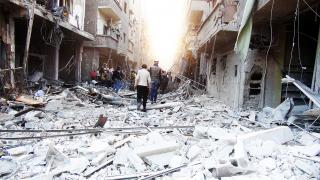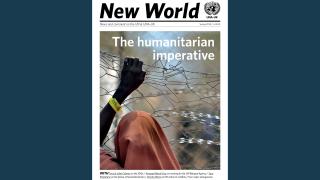
A frisson – of anticipation or anxiety, depending on the listeners – went around the UN High-level Meeting on 26 September 2013 when the Federal President of Austria declared: “Nuclear weapons should be stigmatised, banned and eliminated before they abolish us.”
As over 140 governments departed from the Second International Conference on the Humanitarian Impact of Nuclear Weapons, hosted by the Mexican Government in Nayarit last month, it was clear that something rather interesting is happening in the nuclear arena. What is behind the humanitarian disarmament initiatives, and how are they likely to affect the longstanding problems of nuclear possession and proliferation?
Humanitarian arguments to facilitate disarmament are not new. Recognition of the indiscriminate, disproportionate and uncontrollable impacts of other weapons of mass destruction created strong incentives for banning biological and chemical weapons in 1972 and 1993 respectively. More recently, the unacceptable humanitarian harm caused by conventional weaponry was utilised in successful campaigns to ban landmines and cluster munitions.
When states with vested economic or military interests in these weapons obstructed efforts in established fora, cross-regional governmental and civil society coalitions bypassed the blockages and achieved effective prohibition treaties. Whether they accede or not – and many erstwhile opponents have – all states have ended up having to change their behaviour because of the stigmatisation and restrictions placed on weapons banned under international humanitarian law (IHL).
The application of IHL considerations to nuclear weapons inevitably challenges Cold War power structures and some states do not like it. Some, but not all, nuclear-armed states boycotted the Nayarit Conference, as they did the UN General Assembly’s open-ended working group on multilateral nuclear disarmament in 2013.
In public statements some have said that they prefer to work through the 1968 Non-Proliferation Treaty (NPT) and the 66-member Conference on Disarmament (CD). Less publicly, diplomats have admitted that they prefer the NPT and CD because there they can “control the narrative”. That, combined with the widely acknowledged facts that the NPT has serious weaknesses and the CD has been paralysed since 1996, may be why so many other governments are looking for different ways to accelerate nuclear disarmament.
Attempts to portray the humanitarian initiatives as being at odds with the NPT will not wash. The 2010 NPT Review Conference’s final document expressed “deep concern at the catastrophic humanitarian consequences of any use of nuclear weapons”. Since then, there have been several cross-regional statements on this issue, and these have attracted growing support.
Most recently, in October 2013, New Zealand presented a follow-up humanitarian statement on behalf of 125 UN member states to the General Assembly’s First Committee (which deals with disarmament and international security). This noted that the “humanitarian focus is now well established on the global agenda”, and underscored that the “catastrophic consequences of nuclear weapons affect not only governments, but each and every citizen of our interconnected world”.
If a key motivator behind these new disarmament efforts is to prevent nuclear catastrophes from occurring by accident or design, another is deep frustration shared by the majority of nuclear-free states. Arms reductions are always welcome, but too often they serve to enhance rather than diminish the status and mystique that attracts politicians to nuclear weapons. By reminding everyone that the consequences of nuclear use would threaten everyone’s survival, the humanitarian approach is challenging the status quo assumption that treats these weapons as an issue purely for nuclear-armed states to decide on. The governments in Nayarit heard loud and clear that banning and eliminating nuclear weapons must be a priority security imperative for non-nuclear nations as well.
So far governments are mainly talking about the problems. The International Campaign to Abolish Nuclear Weapons (ICAN) is pressing for a multilateral treaty to prohibit the use, deployment, manufacture, transporting and stockpiling of nuclear weapons, and require their total elimination. With or without the nucleararmed states on board from the start, such a treaty is seen as an achievable next step towards nuclear disarmament. It does not try to solve all the technical, verification and disarmament challenges in one go, but aims instead to give teeth to elimination obligations. Its importance lies in its transformational legal and political role – a clear and universally applicable prohibition that nuclear states cannot weasel out of or manipulate, as they do the NPT.
Even before a nuclear ban treaty enters into force, it will stigmatise nuclear weapons and make it much harder for anyone to keep funding, making and deploying weapons that the rest of the world has undertaken to ban. This could be a great game changer. At the very least it is worth a try!
Rebecca Johnson is Director of the Acronym Institute for Disarmament Diplomacy and Co-Chair of the International Campaign to Abolish Nuclear Weapons.

















